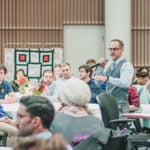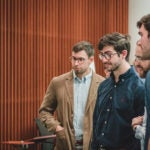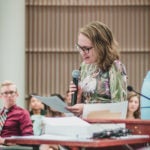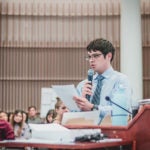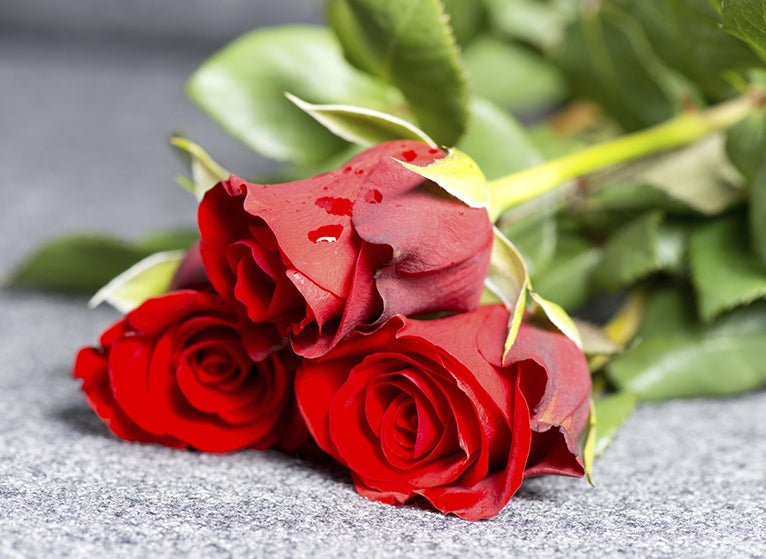
At the annual Anatomical Donor Convocation of Gratitude on Nov. 15, UVA School of Medicine students paid their respects and showed gratitude to the donors who graciously donated their bodies to help the students learn and positively impact future patients.
Organized by second-year medical students, the event was also an opportunity to thank the donors’ family members and tell them how important their loved ones’ gifts have been to their education. The Convocation included the students’ reflections and thoughts on the anatomy experience, as conveyed through art.
We sat down with second-year medical students Nicole Calautti, Adrienne Doebrich, and Mike Salomon, who helped organize the event. They were gracious to share their experiences here.
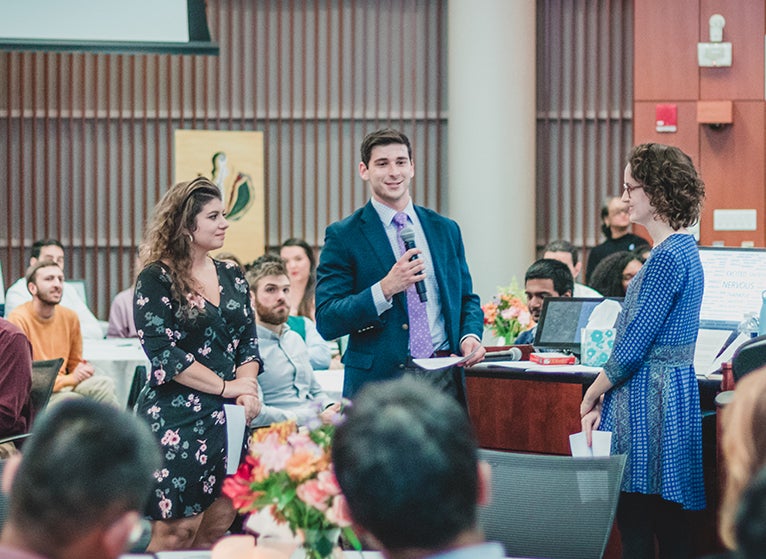
(l-r) Nicole Calautti, Mike Salomon, and Adrienne Doebrich (Photos by Austin Gonzalez.)
You spent most of the calendar year in anatomy class. What was that experience like?
Salomon: Before we go into the anatomy lab for the first time, Dr. David Moyer, the head of anatomy for the medical school, has us submit our thoughts and feelings, and he forms them into a word cloud. Anxiety, nervousness, excitement, fear. Whatever it is that people are feeling. This gets us in the mindset that we’re going to experience a lot of emotions. When I saw my donor, I was overcome with a lot of emotions. Normally the faces are covered, but due to a mishap, my donor’s face was not covered. While it was overwhelming, it also left me feeling a profound sense of humanity. They were not just a tool to learn from, they were a person who had thoughts and feelings and life experiences, just like me. I immediately had an intense feeling of gratitude. I didn’t know that the Convocation event existed. But when I did, I knew I had to be a part of it. It really captured what I felt — and still feel — when you see the donors.
Doebrich: I had a similar experience in anatomy. You have an idea in your head how it’s going to be, but going in is a completely different thing. You quickly get into the swing of things, into memorizing terms and processes. I think the Convocation of Gratitude really serves two important purposes. One is to remind ourselves that we were given this gift by a donor and that it’s important to reflect on why they made the decision to donate and how lucky we are. It is such an invaluable way of learning. The other is that it provides the donors’ families a chance to further understand the decision that their family member made about donating. Based on what some of the family members said at the event, it also served as a part of the healing process. It allowed them to come to terms with their family member’s decision and provided a sense of closure.
Calautti: Throughout the anatomy process, while I was focusing on the science and the learning … while I was listening to instruction, I found myself holding my donor’s hand or putting my hand on their forehead. Like in a comforting or healing way. I was taken aback a bit when I found myself doing this. At a subconscious level, I felt that I was taking care of this person. The experience became very personal for me. At the Convocation, I wanted the family members of the donors to know how personal this was for us. It’s a strange experience, but one for which we are extremely grateful. I think of all the things that I’ve done in my life, organizing different events, I felt like the Convocation is one of the things I’m most proud of. Not because of the logistics of the ceremony, but in hearing these family members talk about how much closure and healing this brought them. I was glad we were able to do this for them.
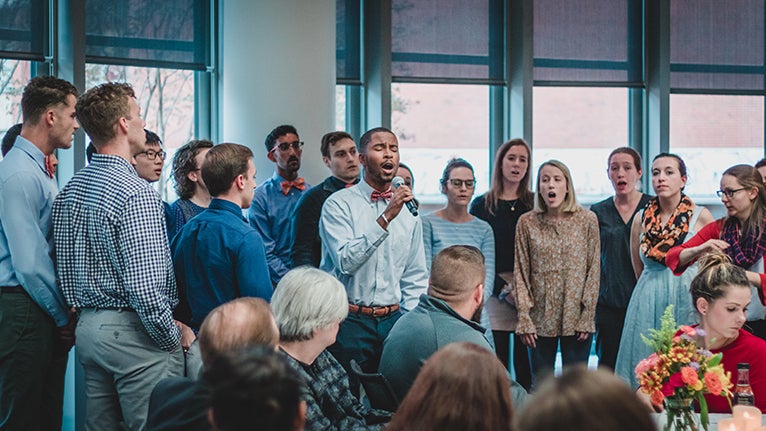
How was the event received by the family members?
Salomon: A lot of the family members spoke at the event, which was really moving. There were some family members who specifically told us that they didn’t want to speak at the event. But, as the afternoon unfolded, they stood up and decided to speak because the atmosphere was so moving.
Doebrich: It was a Domino effect. It was wonderful that they were able to share something about their loved one with us — why they decided to donate, what they enjoyed, who they were. I think, for many of the families, they were afraid to think about what donation really meant. By hearing us speak, sharing our reflections, seeing our artwork that we had displayed … I think that was really helpful for a lot of them. It was an educational experience for everyone.
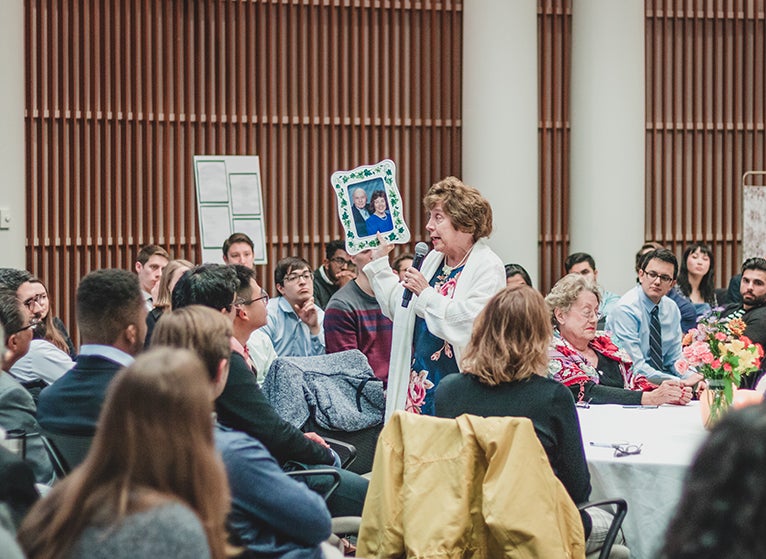
Calautti: The event was really special. Families shared personal stories about their loved ones, and the afternoon illustrated the spectrum of the processes of healing and mourning.
Doebrich: There was one family member who said she was so grateful to be in an environment of what she called humility. She didn’t expect such humility from us as we reflected back on this experience and on the gift that their family member gave. I think that was the perfect word. We really are so humbled by the fact that we’ve had this opportunity to work with these donors.
Salomon: Another family shared with me that they were nervous about what it meant to be an anatomical donor. They were scared because they didn’t understand or know what happens. In seeing how respectful we were and how we venerate these donors, they felt better about the sacrifice that their loved one made. They felt it was worth it because the donors were treated with dignity.
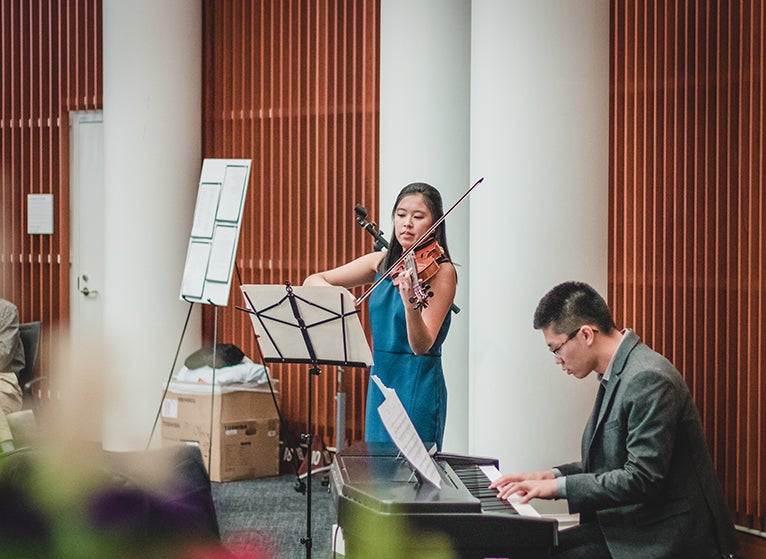
How has anatomy and the Convocation of Gratitude affected you or the donors’ families.
Calautti: The event changed some family members minds on medicine as a whole. One woman told me — and I felt this was powerful — that, after seeing our projects and hearing our words and seeing our performances … she said, “It’s very clear that you all are very talented and could have done a lot of things other than medicine. But I’m glad that you chose medicine, because you are clearly reflective, thoughtful people. We need more people like that in medicine.”
Doebrich: We spend the first year and a half in the classroom, memorizing so much information and this is the first time that I like felt that I had made a difference — which is why I decided to go to medical school in the first place. This was the first moment when I felt I like changed someone’s life for the better.
Salomon: I’ve heard other people say, “Your donor is your first patient.” I didn’t really get what that meant until now, when I was able to reflect on the idea of treating them like a person. Despite all the academics, they are a person.
Filed Under: Education, Featured, Media Highlights

